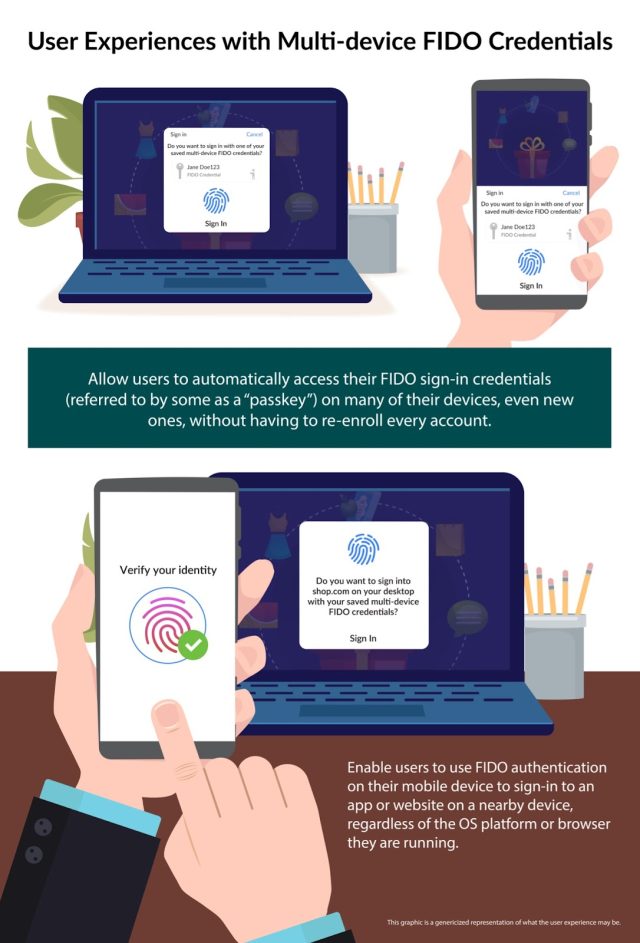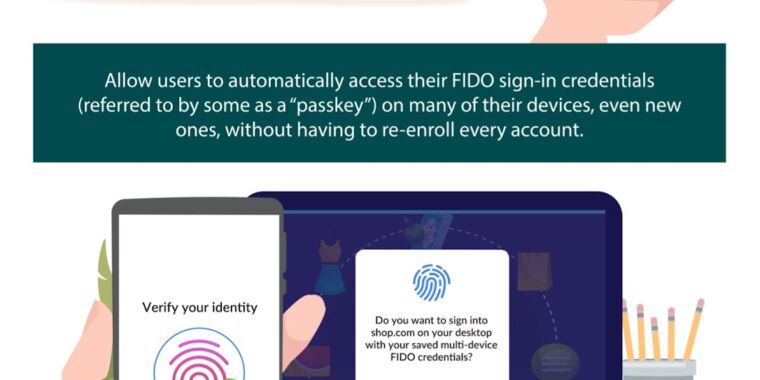The initially Thursday of May well is evidently “Planet Password Day,” and to celebrate Apple, Google, and Microsoft are launching a “joint effort and hard work” to get rid of the password. The significant OS vendors want to “increase guidance for a typical passwordless signal-in regular developed by the FIDO Alliance and the Entire world Broad World-wide-web Consortium.”
The standard is becoming named both a “multi-unit FIDO credential” or just a “passkey.” In its place of a extensive string of figures, this new scheme would have the app or internet site you happen to be logging in to push a ask for to your cellphone for authentication. From there, you would require to unlock the telephone, authenticate with some form of pin or biometric, and then you are on your way. This appears like a familiar method for anybody with cellular phone-based mostly two-factor authentication set up, but this is a replacement for the password somewhat than an extra aspect.
A graphic has been delivered for the consumer conversation:

FIDO Alliance
Some push 2FA units work about the World-wide-web, but this new FIDO scheme works in excess of Bluetooth. As the whitepaper explains, “Bluetooth calls for actual physical proximity, which means that we now have a phishing-resistant way to leverage the user’s cellular phone for the duration of authentication.” Bluetooth has a awful standing for compatibility, and I’m not positive “safety” has at any time been a real concern, but the FIDO alliance notes that Bluetooth is just “to validate physical proximity” and that the true indication-in system “does not count on Bluetooth stability properties.” Of system, that implies equally products will need to have Bluetooth on board, which is a offered for most smartphones and laptops but could be a challenging inquire for older desktop PCs.
Related to how a password supervisor can unify your logins beneath a solitary password, your passkeys can be backed up by some massive system-holder like Apple or Google. This would let you very easily provide your credentials to a new system, prevent you from getting rid of them, and make it quick to sync passkeys across products. If you eliminate your device, you can nonetheless recover your accounts by signing in (uh—with a password?) to your large system-holder account. It may possibly also be a excellent idea to have far more than a single system set up as an authenticator.
Organizations have been making an attempt to go “passwordless” for yrs, but finding there has been tough. Google has a full timeline on its blog article starting up from 2008. Passwords work good if they are extended, random, mystery, and unique, but the human factor of passwords is generally a issue. We aren’t fantastic at memorizing lengthy, random strings of characters. It really is tempting to produce down passwords or reuse them, and phishing strategies try out to trick you into offering your password to a 3rd party. When a safety breach takes place, username and password pairs are effortless to share, and there are massive databases of compromised credentials out there.
The FIDO site put up suggests: “These new capabilities are predicted to grow to be accessible throughout Apple, Google, and Microsoft platforms around the course of the coming 12 months.” Apple, which looks to have commenced the complete “passkey” development, currently has a method up and jogging in iOS 15 and macOS Monterey, but it really is not appropriate with other platforms nonetheless. Google’s passkey help has currently been spotted in Participate in Services on Android, so it must rapidly be supported by even older Android devices as shortly as it truly is prepared.
Listing image by FIDO Alliance



More Stories
iOS Development Insights: Trends and Challenges in Island Growth
Economic Engine: The Impact of iOS Development on Local Communities
Transforming Skylines: How iOS Development Is Reshaping the Landscape